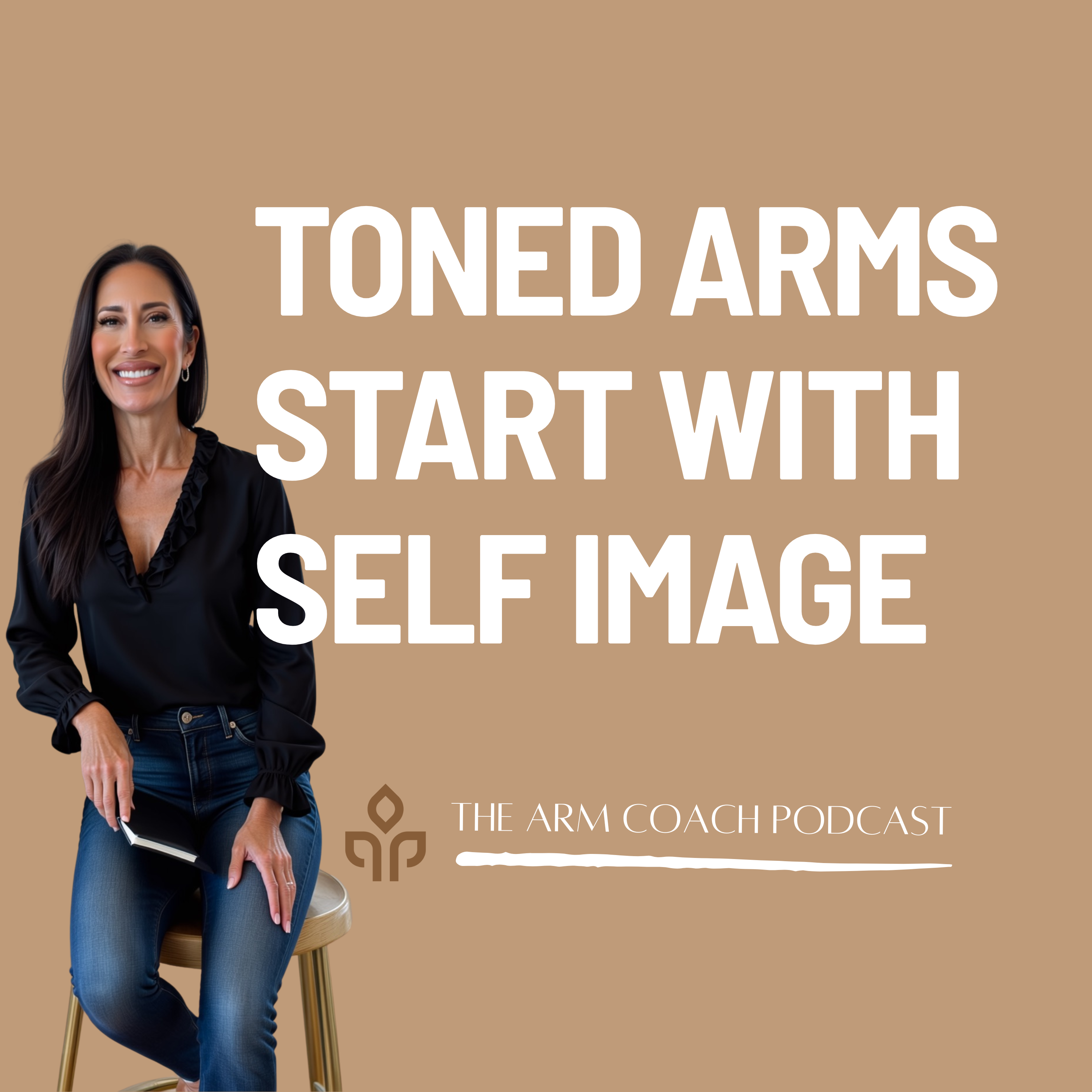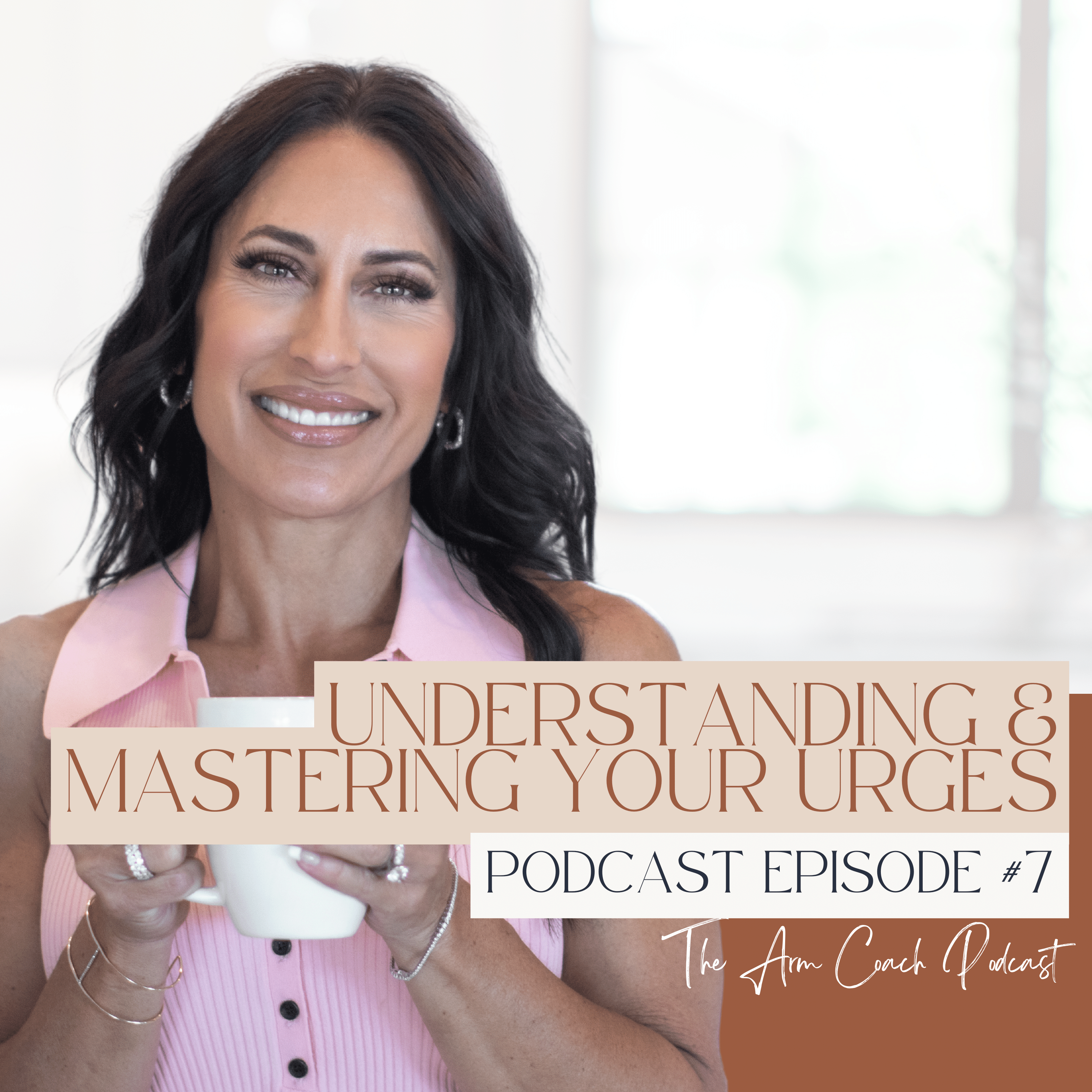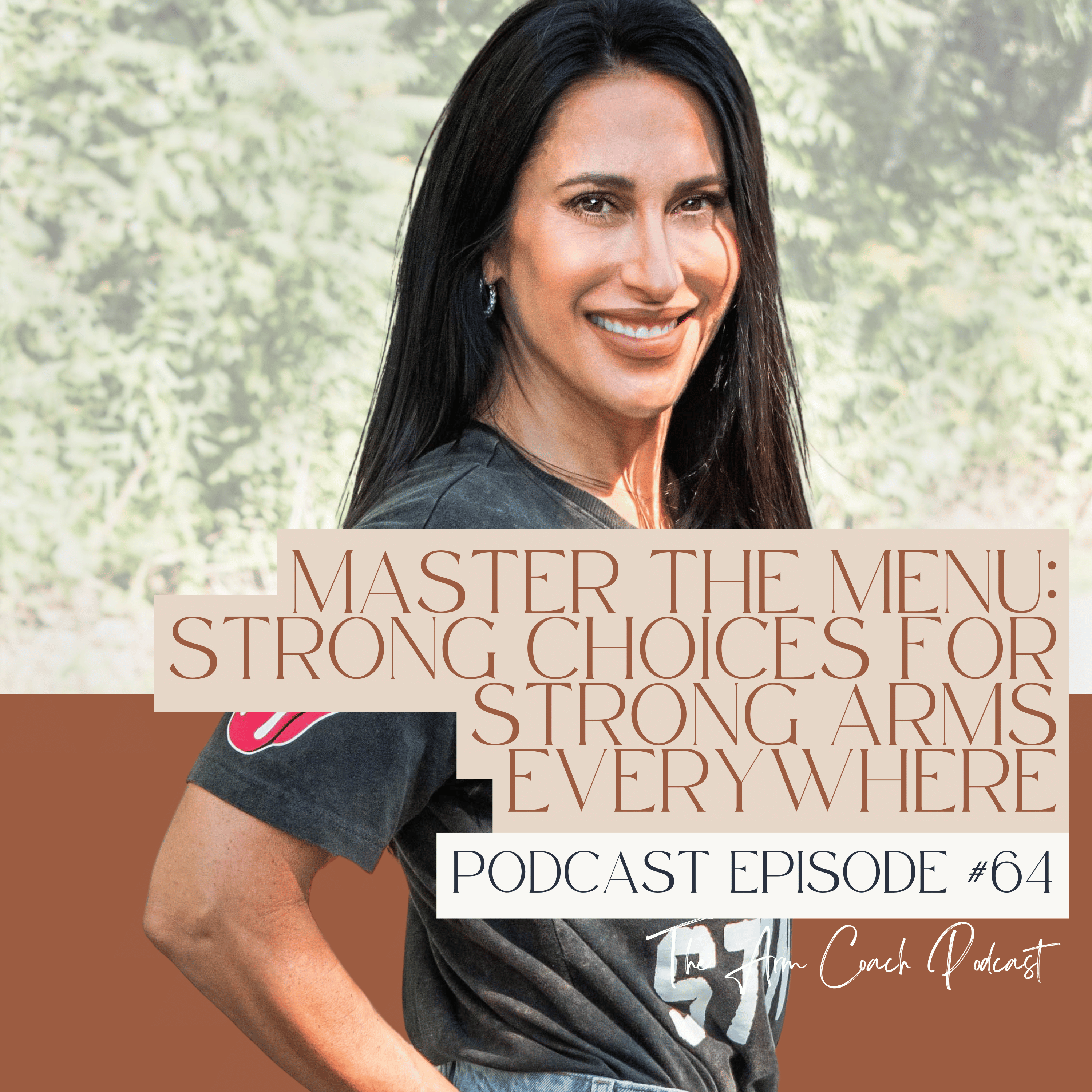Episode Transcript
Hi, everybody, and welcome to The Arm Coach podcast, episode
#6.
Today we're going to talk about why self discipline has such a
bad rap, and how to look at it in a way that will inspire you to
take care of yourself as you set your arm goals and move
towards them. So let's get started.
When I talk about self discipline with my coaching clients, they
sometimes shudder. They think that self discipline means being
very rigid. They think it means that if they're self disciplined,
they'll have no freedom, they won't be able to be flexible or
creative. They fear that they'll be overly structured. They think
they’ll be living as if they're on a very rigid diet, and they’ll have
to deny themselves everything that they want. Have you ever
thought these things about self discipline, before you throw the
whole idea out the window? Well, without self discipline, it's
really hard, if not impossible, to get yourself to do what's
important, so that you never really get what you want. You don't
get the results that you want. And it becomes a situation where
you feel like you're working against yourself. So it's in all of our
best interest to figure out what is loving self discipline. How can I
be disciplined in a way that works for me not against me, and
does not feel terrible.
So let's talk a little bit about what self discipline is. Most
dictionaries define self discipline as training and controlling
yourself, usually for some type of personal improvement. It's a
way to manage your impulses, and sometimes it involves you
refraining from doing something. But you probably see it as
something negative, because most of the people I talk to do.
When you do see it as something negative, you think that
anything that requires self discipline to get it done, means that
you're going to be deprived. Does this sound familiar at all?
When you feel deprived you think, ‘Oh, poor me, it's just not fair
that I have so work hard for this, and I have to deny myself
everything. Why can't I just have whatever I want, eat whatever I
want, do whatever I want, and get the results that I want’.
Deprivation, true deprivation comes when you truly can't get
what you need. And since in 99.9% of the cases of women that I
talk to, they can get what they need, what they really need, so
that if you decide not to give something to yourself, then that is
not deprivation. It's much more of a conscious choice that doing
this, or eating that, or getting up out of the chair, is truly for your
benefit. Not deprivation. We all have, as I've mentioned a few
times, a lot of thoughts a day. Thoughts that just come through
our mind, 1000s of thoughts. And these thoughts create our
feelings. So if we don't find a way to create self discipline that
feels good and loving, then we become a slave to our moods.
Because we're going to be acting on those moods that come
from all those thoughts. And those moods may take us totally
away from where we really want to go. If our mood is negative,
you may eat to avoid that uncomfortable mood, regardless of
what your true goals for yourself are. With self discipline, you're
making a decision to do, or not do something that gets put in
place above your moods. It comes from what you're thinking,
what you really want, not dependent on how you feel. So no
matter what you're working on, arms or otherwise, once you've
decided what's important to you, and in order to get it, there will
be things that you'll face that you might need to say no to. And
that's okay. That's normal. So I think we need a new definition of
self discipline and a new perspective about it.
So firstly I want you to think of self discipline as something that's
done with love and from love. It’s not against us. It's for us, it's
for our benefit. 100%. And secondly, this actually creates
freedom. The ability to get yourself to do what you most want
and need to do. And that's our goal, to feel like we have freedom,
and we're doing what's in our best interest. Now, self discipline
may involve a momentary sacrifice for what you want most,
versus what you want right now. And that's an important
distinction. In the moment, sometimes we stomp our feet and
declare that we must have it right now. But the truth is, that's not
what we really want. And self discipline allows you to truly live
your best life, in your best body, because you're doing what's
good for you. So now that we defined it a little bit, I want to talk
to you about how you can create loving self discipline. So think
first that you need to know yourself. You need to decide what is
truly in your best interest. And think about your goals and your
values. What's most important to you? I want you to write them
down. If you had to name your five most important values, once
you know that, then you can take any decision that you have to
make, an eating or exercise decision or anything else, and hold it
up against your values, and it will be very easy to see what your
choice should be. So for example, if you are committed to trying
to only eat when you're hungry, and not eat when you're not
hungry, and somebody offers you food that looks really good, but
you're just not hungry, you can use loving self discipline to say
‘No thank you’, because you know it's not in your best interest.
When you know that one of your main values is to honor your
health, and enjoy a fit body, it’s not going to be hard saying no to
food that your body does not need. Because you're lovingly
saying no to the food, but you're saying a big yes to you. To
what's most important to you. When you become more
conscious, you notice what you're doing. And you notice when
you're acting undisciplined. If you start hearing yourself making
choices and saying, ‘whatever’, I want you to catch yourself.
That’s like a red flag. Catch yourself and get back on your path.
So becoming more conscious is one of the steps you need to
take to start putting loving self discipline in place. Don't be upset
if it takes several tries to catch yourself when you're doing
something that you know you don't want to be doing. Eventually
you’ll catch yourself sooner and sooner, until you’re able to catch
yourself before you begin doing whatever it is you're doing. I
want you to also think about making a true commitment. Really
thinking to yourself, ‘I'm going to follow through on blank’. And
verbalize what it is you're committing to, and when and how
you're going to do it. And then think about tracking it. One of the
values of keeping a journal, and even a food journal, is that you
see the reality of what you're doing. You're not trying to
remember, you're not trying to guess. You see it in black and
white. A lot of clients rebel against it. But you know what, people
who keep a journal and keep track of things, without the old diet
mentality that they're going to beat themselves up if it's not
perfect, those people do better because they're focusing on
what's actually happening. Unless you see the reality of what
you're doing, so you could see if you're being lovingly self
disciplined, or if you're being not so lovingly self indulgent. For
example, think about a child. When we are indulgent with a child,
that child is not used to hearing No. And it reacts to No with
frustration or anger or shock. It's just not used to hearing it. And
that child may grow up to be a very self indulgent, totally
pleasure oriented adult. It's not in our best interest. Yes, I want
you to have pleasure in your life every single day, if possible, but I
don't want you to be only focused on pleasure and give up
what's most important to you. So we need to train ourselves to
be lovingly self disciplined, not self indulgent. Now sometimes
you may think that you shouldn't have to say no to yourself. Why
do we think this? We think this because we are just having
thoughts. We're telling ourselves that we should get whatever we
want. We shouldn't have to deny anything to ourself. When we
do this, we're acting like that spoiled child, and we're stomping
our feet to get what we want. Not a very pretty picture, would
you agree? Even when what we want is not in our best interest, if
we're telling ourselves that we should never have to say no,
we're going to feel deprived. We're going to get upset. We're
going to make things harder instead of easier. Now, saying no to
yourself doesn't feel as hard or as bad or as challenging when
you know why you're doing it when you’re doing it, because you
truly care about the outcome from that yes, or from that no. So
saying no may be challenging until it's a habit. Your moods may
challenge your self discipline. I want you to be honest with
yourself about how it's going to go down. I want you to
acknowledge that this is going to be a challenge. Don't try to kid
yourself by saying, ‘All right, I'm going to tell myself what to do.
I'm going to make a commitment. I'm going to make decisions in
line with what's important to me. And I've got this, and it's going
to be easy.’ You have a habit of saying yes to yourself sometimes
when you should say no. So let's be honest, it's not a problem,
but it's not going to be a snap. It's not going to be so easy.
Expect it to be a challenge. You can handle challenges. I would
rather hear you say, “eating the amount of protein my body really
needs is one of my values. So I'm going to say no to sugary food
to make room for protein. I'm doing this because in the big
picture, it’s what I really value and want most, but I know it may
feel challenging right now. It's important to me, I can do this.’
When you're trying to become more aware of what you're doing
and occasionally say no to yourself, or guide yourself to a better
choice, I want you to pause and check in with yourself and ask
yourself some questions like this. ‘How am I right now? What am
I feeling?’ And truly answer yourself. What do I need right now?
What is my commitment to myself? And what's really in my best
interest? The important thing is to ask these questions and have
this talk with yourself in a really caring, loving way. This is not the
time to channel your inner prison warden. This is not a contest to
see how strict and mean you could be to yourself. It's acting like
you want the best for yourself. Sometimes it helps here to find an
accountability partner. Someone you could go to and say, ‘I really
feel like indulging in this. What do you think?’ because that
person can help remind you of what truly is much more important
to you than a chocolate cupcake in the moment. And start with
small challenges. If you always clean your plate, and your goal is
to stop eating when your body's had enough, set a tiny little goal
of leaving one bite. If you typically eat when you're bored or
upset about something and you're not hungry, and your goal is to
wait to be hungry to eat, then I want you to try setting your clock
so that you have to wait just five minutes before you eat. Or if
your typical daily menu consists of what I'd consider mostly treat
food, then make your tiny little goal and your self discipline
exercise, to just try one vegetable a day. So there are tons of tiny
decisions like this that you make every day. All these decisions
add up to your reality right, your arms, your life, everything. Now
self discipline is what you need. It's what’s required if you want
toned sculpted arms, or you wish any part of your life was
different. Our goal is to use loving self discipline, so that it
doesn't feel like you're forcing yourself. But instead, it feels more
like you gently guiding yourself toward what's really important to
you. It's all about creating rules for yourself that feel like love, not
pain, not hate. This week, what I would like you to think of, is one
small act of loving self discipline that you can create for yourself
and see how it goes. See how it goes when you think of it as love
instead of deprivation, or punishment.
That’s it for today. I will see you next week.


